they/them, physicist, revolutionary anti-capitalist, philosopher, trying my best every day
Last active 3 hours ago
Don't wanna be here? Send us removal request.
Text
Mitski’s “I bet on losing dogs” and Ethel Cain’s “Head in the wall” back to back exactly describes the journal session I’m having
2 notes
·
View notes
Text

POLYAMORY?? (nice)
preceded by:


Spin this wheel of ~300 AO3 tags three times.
57K notes
·
View notes
Text
i feel like people dont think im serious when i say "death to America" but like my ultimate dream is for the USA to no longer exist like of course i dont respect politicians or cops or the law i dont want a "better America" i quite literally do not want the entity known as the United States of America to outlive me
7K notes
·
View notes
Text
In the future, children will think our ways are strange. "Why do old people always grow so much milkweed in their gardens?" they'll say. "Why do old people always write down when the first bees and butterflies show up? Why do old people hate lawn grass so much? Why do old people like to sit outside and watch bees?"
We will try to explain to them that when we were young, most people's yards were almost entirely short grass with barely any flowers at all, and it was so commonplace to spray poisons to kill insects and weeds that it was feared monarch butterflies and American bumblebees would soon go extinct. We will show them pictures of sidewalks, shops, and houses surrounded by empty grass without any flowers or vegetables and they will stare at them like we stared at pictures of grimy children working in coal mines
95K notes
·
View notes
Text
im gonna be honest it's kind of hard to watch all the shit trump and his admin are pulling without getting even madder at biden for doing jack shit about his campaign promises. student loans, minimum wage, reproductive rights... and i know some picrew icon who voted for the first time last year is already rushing to the reblog button to write a YA protagonist monologue about how those would have been/were blocked by congress/the senate/inclement weather/etc. but the thing is that at this point i literally do not care about "established legal and political processes" and "working within the system", i just want my views enacted into law. which would be childish if it wasn't the exact strategy that has been working unbelievably well for republicans for the last decade!
i want to grab a democrat career politician by the shoulders and scream in their face: do something good for once in your god damn life! fuck "checks and balances", fuck "legal precedent", just keep packing the courts and gerrymandering districts and throwing shit at the wall until something sticks! fucking fight back god dammit! where's your dignity? your rage? your humanity? you're playing checkers against someone eating your pieces while adding their own to the board and you're trying to give an impassioned speech about how "they go low we go high" while they simultaneously piss on you and shoot your dog!
8K notes
·
View notes
Text
I feel like shopping plus size is like that scene from the good place where she’s like I have the thing and he’s like and it’s not a cactus or whatever. it’s just like 2x and im like are you sure tho??
2 notes
·
View notes
Text
My mother used to say people were either spaghetti or a waffle.
a short poem, 01/13/2025
my father was a waffle, neat and everything could fit in a box.
my mother was spaghetti, everywhere and entangled.
I try so hard to be a waffle, but I am my mother’s child. I am scattered, stretched thin, only organized by the amount of space I take up.
How does a spaghetti become a waffle?
You cannot unboil the noodle, you cannot harden it back into a straight line.
It will never form a grid, organized and tidy.
The sauce will seep into and onto anything it touches.
I try so hard to be a waffle, but I will always be a spaghetti-waffle.
2 notes
·
View notes
Text
I wrote a story about a DnD character I played as for about a year and a half that takes place after the events of the campaign, and it doesn't make much sense without context, but I wanted to put it out there because I'm really proud of it. So here's "One More Journey".
Lucien wrung his hands together as he paced the lab, his mind racing. The rough skin slid across itself, a reminder of the countless nights of toil and tinkering. Fingers gripping metal, deafening clangs resounding in the dead of night, a dull ring in his ears. Molten metal burning through his robes, the ice cold chill of tempering water. The frozen shell of His body as He lay on the ground, His voice fading away for the last time, and that accursed, wretched, foul mage—Lucien opened his eyes, unaware that he had closed them. He felt his ears flick once, picking up the sound of rapid clink-clink-clink from below. Glancing down, he noticed his clenched fist now rested on the lab table, the ring on his finger hitting it again and again. He was trembling.
The artificer sighed, slipping the ring off his finger and inspecting it. Inscribed upon the surface, in delicate wiring, was the sigil of Bellspire’s School of Artifice. Lucien recalled an evening of revelry as his appointment to the position of Master of Artifice was finalized, when one of his colleagues presented the ring to him. It was truly beautiful; a work of art, even. It glowed a dark blue, bold against wrought black metal. Lucien blinked once, and remembered a vision of Him, standing in a divine void, a pale imitation of who He once was. Learning the fate of the old world, being offered a chance to join the new one, all in His voice. Dark blue accents. Black metal. Lucien blinked again, and the vision faded. He thumbed the ring for a moment, before quickly opening a drawer to his right stuffed with spare scrolls and papers. He threw it inside, closing it with a huff.
Lucien tugged lightly on the lapel of his pale yellow jacket, glancing around the lab as if to dispel an illusion. The soft light of the morning sun streamed in through small windows situated near the ceiling of each stone wall, illuminating the ordered chaos of the laboratory. His eyes swept across the dozens of complex contraptions strewn across several sturdy tables, each surrounded by a plethora of esoteric tinkering equipment. Some of the devices appeared to be in a completed state, while others were seemingly cannibalized, their mechanical innards littering the floor and surfaces of the lab. Lucien’s gaze drew to the legions of technical diagrams spread across the walls, almost entirely concealing the stone beneath.
The artificer’s journey concluded at one diagram in particular, floating above a particularly neat portion of the lab. A fond smile crept onto his face as he approached the diagram, before which sat a large contraption, its length and width nearly reaching Lucien’s significant height. Stopping before it and stooping slightly, he ran a hand down its side, checking for any blemishes or buildup of dust. After a brief inspection and an approving nod, he straightened back up, shifting his attention to the diagram above.
A chaotic spread of technical jargon was scrawled across its surface, surrounding and indicating a shape resembling the device before the shifter. The top of the diagram, in large, bold print, read: “Fluxweave Engine, Mk. 8`12`3”. Below it, in significantly smaller font, a subheader read: “Lucien Tirelis, MA, and Contributor”. Lucien’s eyes remained fixed on the word ‘Contributor’ for a moment, before he glanced back down at the Engine. He tilted his head, a lock of pale blonde hair falling across his face as he inspected it for a moment, briefly considering tinkering with it. The amicite containment field always needed adjusting, right?
Once more, Lucien’s ears flicked, catching the sound of a soft, light ring of metal against metal outside. His head quickly swiveled in the direction of the noise. Through the window in the door leading into the garden, he caught a glimpse of the small wind chime he had installed some months ago. As the chime blew in the wind, behind it, the artificer’s eyes focused on a lone figure standing in the garden. The metallic humanoid hung limply from the apparatus it had been constructed upon, devoid of nearly all features. Lucien quickly turned his gaze from the window, biting his lip. Fine, then. It was time.
The shifter strode across the lab purposefully, bending down to snag his boots. With the poise of a thousand nearly-missed lectures, he slipped them on with ease, twisting to make his way to the door to the garden. As he reached out to open the door, his hand hovering over the knob, he glanced at the well-worn journal resting on the table beside him. It lay face-up, a checklist scrawled on both visible pages. Each entry had several checks beside it. Number 5, “Ensure the integrity of the weave-integration matrix”, had 6 checks; number 9, “Finalize the cohesion and accuracy of the info-construct”, had 3 checks; number 14, “Test the malleability of the rhizomatic personality unit”, had the most checks, at 12.
Lucien hesitated for a moment, staring down at the checklist. He couldn’t keep putting this off. He blinked once, before reaching for the journal, closing it. With a huff, he turned back to the door to the garden and opened it, squinting as the light of the morning sun embraced him in full. As his vision cleared, the artificer beheld the garden, and marvelled for a moment at its development. The flora of Bellspire, aided in part by the School of Botany, was always a lovely sight. It didn’t hold a candle, however, to the majesty of the specimens from the Gilded Isles.
Enormous crimson flowers dominated the landscape towards the back of the garden, massive stigmas sprouting from their centers. Deep green foliage crept across the ground and twisted its way into every available crevice, creating an intricate and beautiful network of hue among the violets and yellows of the garden. Lucien felt an affectionate smile pull at the corners of his lips as he remembered the day that his friend Aleki arrived at his lab out of the blue, exotic plants in tow on a cart. After he had put up a weak veneer of protest, the next week had been dedicated to planting the specimens, learning their proper care, and reminiscing on all they had done together.
As the memory faded, Lucien’s attention returned to the figure before him, its limp metallic form attached to a harness. A faint strand of magical luminescence hung taut from the top construct’s back to the harness, giving it the appearance of a puppet whose string had been cut. The shifter stood before it, tugging once at the lapel of his jacket as he began to hear his heartbeat in his ears. Everything would be fine. The checks had been run. He was in an environment and condition that shouldn’t frighten him. Aphostus had given Lucien this opportunity, and he was going to take it. He exhaled shakily, before slowly approaching the construct. He reached out, hesitating for a moment, his fingertip hovering just beside the exposed power unit. Then, with a soft spark of arcane energy, he powered OPUS on.
Dark. Empty. Cold. Wait, not cold. Warm? Yes, that was the word. Warm. He felt warmth. He? Yes, that feels right. Strange senses assaulted his mind from every direction. These were…sounds. Yes, he heard birdcall. Chirping and whistling and cooing, and the sound of wind through leaves, and the cling-a-ling of a wind chime. He knew of all these things. How? But amid all of this, the world was still dark. Perhaps these were all the senses he was given? But no. He felt something. A twitch on his…face. He tried to twitch voluntarily, and felt the darkness shift. A-ha! He tried it again, and the darkness seemed to weaken. More…more…and suddenly, he beheld the world.
The light assaulted his senses, and he instinctively raised an arm to cover his face, blinking rapidly. As his vision adjusted, he focused on the appendage before him, head tilting slightly. This was his…arm. He was a warforged. That’s right. He looked around blearily at the environment around him, his eyes widening at the sight. An explosion of color in more shades than he could imagine lay before him, and he instinctively moved forward to inspect the shapes more closely. He felt a slight resistance at the top of his back, but pulled forward until it faded.
He clambered over to the shapes, eyes widening in awe. These were flowers. He turned to a strangely-shaped protrusion, studying it closely. This was a mushroom. His head swiveled to the right, leaning into the strange green growth on a section of wall. This was…moss. Yes, moss. He darted from discovery to discovery, before the plod of feet against grass pulled him from his exploration. He turned around quickly, stiffening at the sight of a figure standing before him. It looked strange. Pale blonde hair, large blue glasses, a long tail swinging back and forth behind it. It approached, both hands gripping the inside of its jacket, its eyes wide.
“OPUS…?” it asked, its voice quivering strangely.
OPUS…OPUS? He tilted his head to the side, eyes trained on the figure before him. It sounded right. Like ‘him’ and ‘he’ and ‘flower’. His gaze trailed down the figure’s form, taking in every detail, before making its way back up. If he was OPUS…that made the figure…
“Lucien Tirelis?” OPUS responded, standing up from his crouched position beside the flora.
At that, Lucien’s face seemed to crumple, the thin veneer of stability crumbling. His eyebrows angled upwards, his eyes seeming to shrivel, as his chin began to quiver. He exhaled sharply, adjusting his glasses and running a hand through his hair.
“Yeah, that’s, uh…that’s me.” He sniffed once. “I’m glad you know who you are. That’ll make things a whole lot easier,” he said, loosely pointing at the construct while chuckling softly.
OPUS stood before the shifter, unmoving. He narrowed his eyes, wracking his brain for more information. He suddenly straightened his back, a crucial fact making its way into his awareness. “You created me,” he stated matter-of-factly.
Lucien sucked in breath with a start, once more placing his hands on the lapels of his jacket. “Yes, that…that’s right.” He looked at the ground for a moment, shifting his weight back and forth, before fixing his gaze upon OPUS. “And I’m…so glad you’re here. I truly am,” he said with a quiver in his voice. He exhaled sharply with a smile, his face once more crumpling for just a moment. He sniffed once, looking around the garden idly. “I suppose you’re wondering where you are. That would be…”
“Bellspire,” OPUS interrupted, glancing at his surroundings as Lucien had done. “Or at least, just outside of it. Your private laboratory.” The information seemed to be coming easier now, his processing coming online. He glanced up, noting the position of the sun, so bright against the rich blue of the sky. He was silent for just a moment. He then pointed towards one corner of the garden. “It should be just that way, about 5 miles. There’s all sorts of things there that I have no idea about,” he said, his voice trailing off.
Lucien’s head turned in the direction that OPUS pointed, marvelling at the speed of the onset of his cognition. He hesitated for several moments, seeming to agonize over something, his eyes shifting from the construct, to the indicated direction, and back to the construct. Finally, he cleared his throat, nodding towards OPUS’s heading. “Well, uh…if you’re interested, we could…go there,” he said quickly.
OPUS merely fixed Lucien with a stare, though the shifter had the distinct feeling he was rolling his eyes. “Of course we’re going there, you ass,” he snapped. He pointed at the sky. “That thing is going down in 10 hours, and it’s my first day. We’re already wasting time.”
With that, the construct began to trudge towards the small gate in the garden’s fence. As he pushed it open with a creak, he stopped, noticing the lack of movement behind him. He turned his head, finding that Lucien hadn’t moved an inch. He stood at the center of the garden, a few feet from the empty harness, staring at OPUS with the strangest half-smile. He was about to reprimand the shifter once more, before he shoved both hands into his pockets, slowly striding towards the gate.
OPUS’s eyes followed the artificer as he passed by, exiting the garden and making his way towards the horse-drawn cart outside the lab. After a moment, the construct followed him.
“What was that about?” he asked, standing beside the cart as Lucien whispered to the horse and hitched it, calling it by its name, Bill.
Lucien sighed, lowering his head. A moment passed in silence between them. He then lifted his head slightly, his gaze seeming to pass straight through OPUS, causing the construct to shift his weight slightly. The strange look in his eyes seemed to fade before a nostalgic smile crept onto his face. He finished preparing Bill for travel, hopping into the driver’s seat. He turned to face OPUS, who had remained standing beside the cart.
“Just…remembering,” he stated simply, the lines around his eyes seeming to deepen. The moment passed however, as he slapped the wooden surface before him, breaking the tension of the moment. “Now come on! Bellspire is waiting.”
The construct paused for a moment, before shaking his head incredulously, heaving himself upwards to sit besides the artificer. With a grin at his companion, he spurred Bill onto the dirt road. The sun continued to rise high into the sky as Lucien and OPUS travelled together to Bellspire, bantering as they once had in another time and place.
2 notes
·
View notes
Text
I think, if we’re very careful about it, hatred—like grief—can be a crucial expression of love. I struggle every day to rectify my hatred of the state of the world with my love for humanity, and this is partly why. It’s very easy to believe that these two fundamental aspects of our humanity are different. This is not so. Grief is love persevering even in the absence of our beloved, and hatred is love twisting itself into a shape that can protect our beloved.
Whenever I'm studying Marxism (and that's quite a lot of times actually) I remember Marx's idea that Revolution can only take form through hate.
Of course, I know now it's a very specific form of hate and that it's pointed to a specific community of people but when I started learning about it, I often found myself rebelling at the notion of hatred as a conductive to Revolution.
I thought hate was too volatile, too savage to be trustworthy but as I grow older and see the world as it is I see myself tasting that hate — and it's hard to actually put into words but this hatred is not ugly and unpredictable.
This hatred is actually quite beautiful, it's not a firing blaze scorching down the earth but a burning fire cleansing a wound, it's born out of indignation and love for humankind. It's there because I love humanity so much I can't help but feel the indignation for what happens to us to my very core and I can't help but turn this into anger, into hatred against those I know are responsible for this.
I really think Marx was onto something with this besides the whole political and economic points he usually made.
#grief#hatred#anti capitalism#free palestine#staring at a wall for 20 minutes thinking about love and hatred#I love revolutionary philosophy!!!
31 notes
·
View notes
Text
This is real. To argue against revolution on the basis of “The most vulnerable among us will suffer!” is to assume not only that the most vulnerable among us are not already suffering under the heel of global capitalism, but also that we aren’t the ones at the forefront of the liberation effort. This is why coherent, strategic organization is SO IMPORTANT. So that when the capitalist modes of support, exploitative though they may be, collapse, we DON’T see disabled people suffer. Even amid the revolutionary effort, community effort must pick up the slack to support us. This strategic allocation of resources is essential to ensuring that the world we create has people in it that know they will be taken care of, no matter what happens.
very strange to me how some people on this site regard violent resistance as an infrastructure-destroying solar flare. i don’t think any socialist outside the one they make up in their liberal mccarthyist fantasies conceptualizes “revolution” as a single mass destructive event that wipes out disabled people in its wake. i know that ableism is rampant in leftist spaces, but i think the best well-meaning organizers care about sustaining the most vulnerable people as they mobilize the struggle against imperialism.
one post i saw recently was made by a doctor who asked people to consider the sick children in hospitals who would die if medical supply chains in the global economy were hypothetically disrupted due to this alleged revolution. it was telling that their post (and ppl’s tags/reblogs) made no mention of the public health consequences of the US embargo on cuba nor the literal children dying and becoming disabled right now in gaza because a hypermilitarized imperial power is bombing their homeland and hospitals.
#anti capitalism#revolution#organization#disabled#free palestine#KINDNESS MUST PERSIST EVEN AMID HARDSHIPS!!!
6K notes
·
View notes
Text
How to stop feeling like I'm not meant for this world
10K notes
·
View notes
Text
TO LOVE—
TO CARE FOR OTHERS,
TO ACTIVELY CHOOSE KINDNESS,
TO TRY, EVEN IF IT’S EMBARRASSING,
TO REACH OUT (FOR HELP OR TO HELP OTHERS),
TO ASK FOR NOTHING IN RETURN—
TO LOVE IS TO BE REVOLUTIONARY.
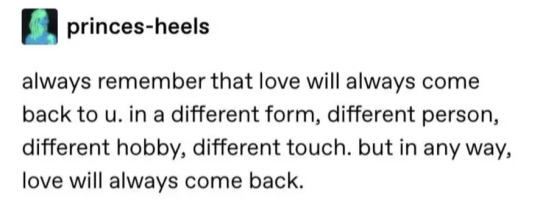
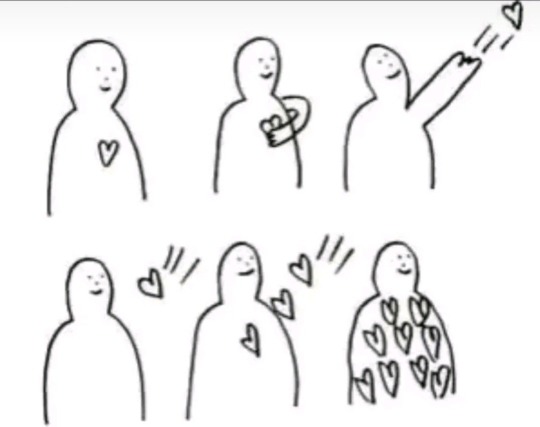
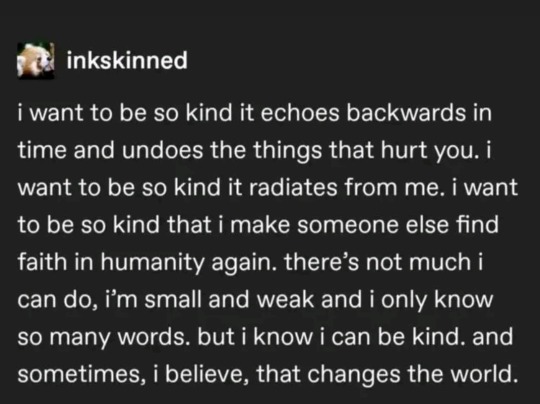




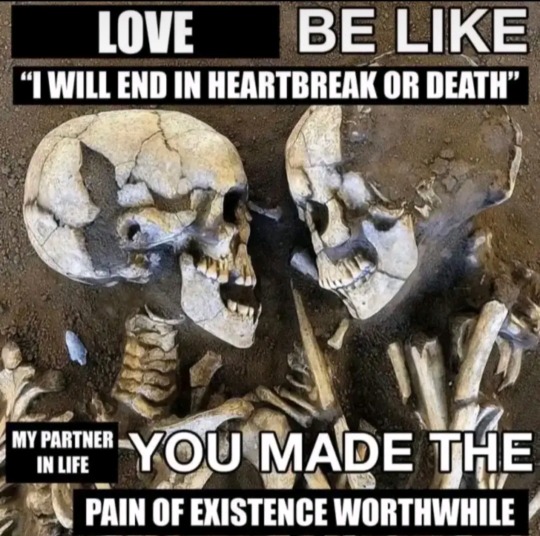
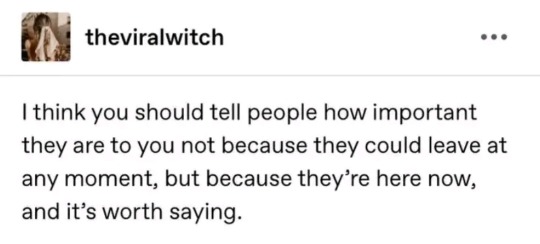
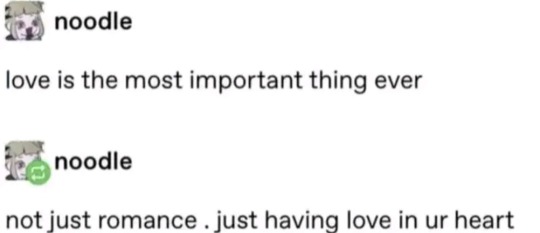
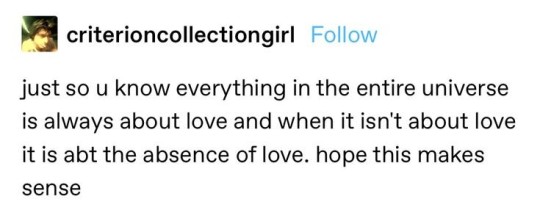
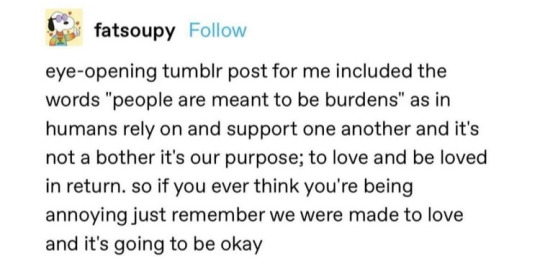
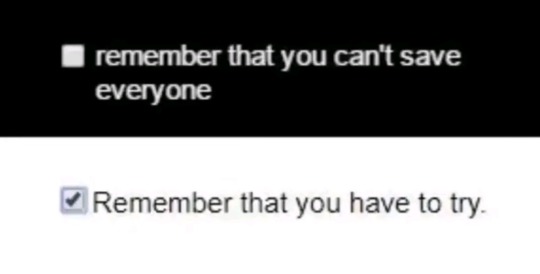


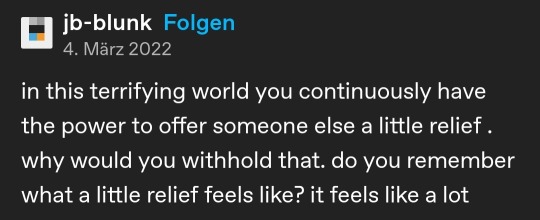

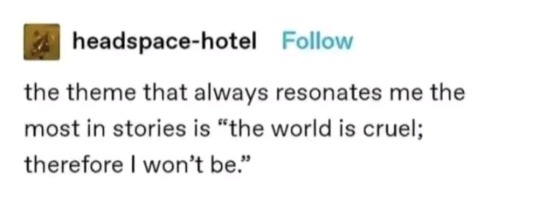

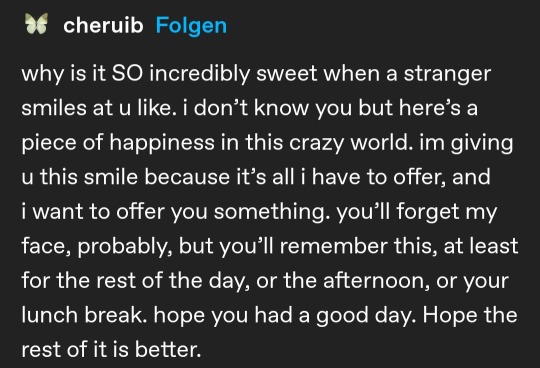
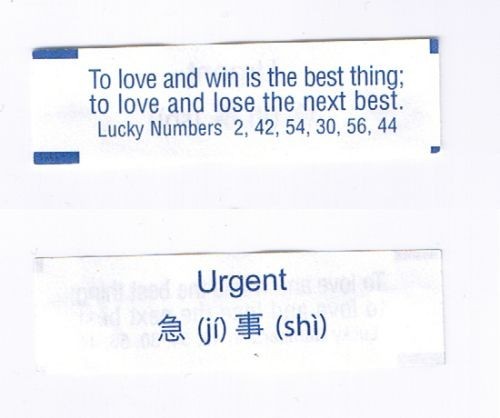


On Love and Community
@princes-heels // ? // @inkskinned // mitski, my love mine all mine//@littlespoonsokka // @boymiffy // @2aminhouston // ? // @theviralwitch // @noodle // @criterioncollectiongirl // @fatsoupy // ? // @mjalti // george saunders, congratulations, by the way// @jb-blunk // @ponchopeligroso // @headspace-hotel // everything, everywhere, all at once(2022) //@cheruib // ? // ? // @tordenvejr
36K notes
·
View notes
Text
I sometimes think about the way in which my life will be defined by the choice I’ve made to pursue my responsibility, rather than my passion.
In my heart, I am a physicist. I’ve known this for years, and every article, scientific paper, and video I watch is like a spark in my chest. I immediately want to tell my partner, my family, or anyone who will listen all about it. I want to ramble on and on. I want to write my own papers, decipher the mathematics underpinning reality, and contribute to our expanding understanding of the universe.
But I don’t know if I can do that.
The world is on fire. Ecosystems are on the brink of collapse across the planet. ‘Unprecedented’ weather events are occurring more and more, and millions of people are suffering because of it. The capitalist institutions of power responsible for this devastation answer to nothing but their zealous pursuit of wealth. They won’t stop until every last ounce of profit is squeezed from the husk our once beautiful world, and will employ any and all means of crushing resistance.
I’ve realized that, before anything else—before even pursuing what makes me feel alive—I must do what I can to make the world better. I’m only one person, but that’s all that any of us are. We were born without the means to survive on our own, and nothing has changed. However, we’re now equipped with the ability to ask for help. To gather together, and to act on the belief that we as a species need not prioritize the accumulation of capital above all else. We can do more.
We can be kind, for kindness begets kindness.
We can love, for its supply is bottomless.
And we can care for each other, a Vanguard towards a better day.
Perhaps, as a people, our responsibility for each other can become our passion.
#anti capitalism#climate change#climate justice#philosophy#sad rant turned into a lecture lol#first real post I guess?#free palestine
4 notes
·
View notes
Text


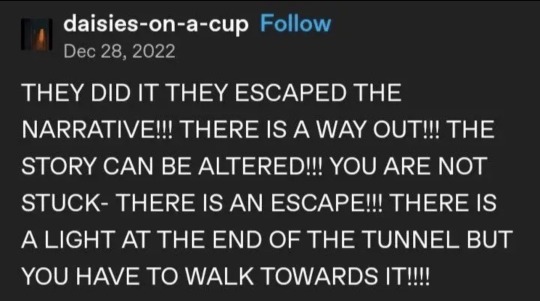
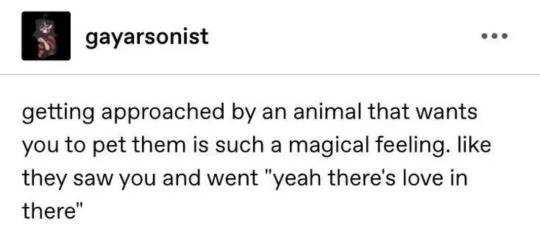

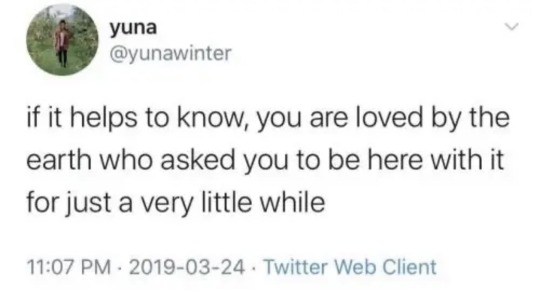
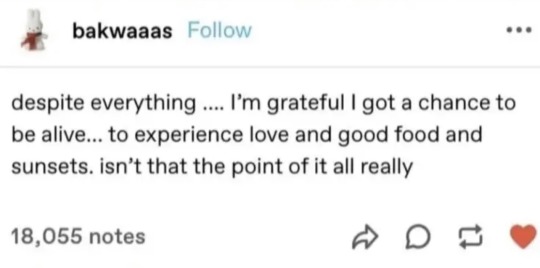
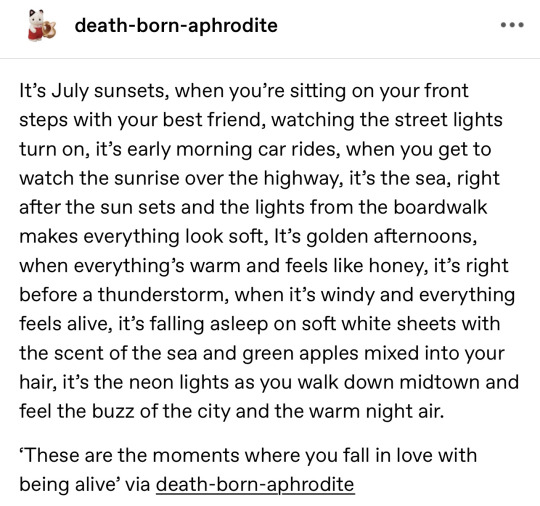


-despite everything, there is still love
@arthoesunshine/ @artsheila/ @daisies-on-a-cup/ @gayarsonist / @hjarta/ @yunawinter on twitter/ @bakwaaas/ @death-born-aphrodite/ anon on gentleearth/ @classicnymph on twitter
60K notes
·
View notes
Text
Welcome to:
Achais’s Fundamentals of May!
The post at the end of each month where I list my favorite 10 songs that I’ve been listening to. This is in no particular order.
I wanted to start this monthly roundup as a way to not only have an archive of my changing music tastes, but have a kind of soundtrack for my blog. Without further ado, here they are!
#achais’s fundamentals#first time tagging a post yippee!#I’ll try and remember to do this at the end of each month#hopefully some people find my blog and will remind me rip#free palestine#Spotify
0 notes
Note
Can you explain like I'm five years old exactly what Marxism is and how it works? What would a Marxist world look like for you?
I know Karl Marx was a guy like 200 years ago and he had certain ideas about how the world should run.
I just can't understand the original sources and like i tend to think in more practical every day person terms and less...society planning. If that makes sense.
I'm anarchist myself, but like at the end of the day we all want human rights I think so idc. Your thing is just as valid as mine. :)
What Is Marxism?
Marxism is a deep philosophy with a rich intellectual history, which, without even taking into consideration the philosophy that came before it, has developed over the course of more than 180 years.
It was first outlined by Marx and Engels over the course of more than four decades, and by Marx’s own admission should be called Marxism-Engelism (Bertsch et al 1976, 15). After the death of Marx, and later Engels, it was then developed by novelists, theoreticians, philosophers, economists, and many others up to the present point. Prominent examples are Lenin, Mao Zedong, Angela Davis, Herbert Marcuse, and Franz Fanon. The relevance of Marx’s philosophy has never been greater. The economic system that Marx and Engels originally set out to critique still exists. More than that, it has spread to almost every corner of the globe and has developed significantly, and thanks to advances in education, the possibility of comprehending the system that shapes our daily lives, from work, to friendships, to familial relations, to culture and religion, and even politics, has become ever greater. Yet many people do not understand the work of Marx and others like him. This is due to a variety of factors. Technical and outdated language, lengthy texts, complicated economic formulas, lack of time to study or read, these are all commonly heard reasons and complaints as to why people presently do not comprehend Marx’s work and thus fail to grasp its significance. Although the best way to learn Marxist philosophy is to read and critically engage with the original texts, this series of essays aims to promote Marxist philosophy, past and present, and help newcomers understand its basic premises and claims. This first essay in the series aims to outline the basic components that are necessary to comprehend all later works. Later essays will focus on each individual component and provide a more complete overview. The two basic components that Marxism bases itself on are philosophy and political economy. More specifically, Marxism synthesizes the philosophical theories of dialectics and materialism, and most completely analyzes economic processes in capitalist society, and based on its discoveries, promotes a new economic form and a new society. These components will be further outlined and explored in a little more detail in the upcoming paragraphs. The first essential philosophical concept that Marxism builds upon is the dialectic. Dialectics are essentially a way of viewing all sorts of processes. A form of reasoning already practiced by the ancient Greeks (Engels 1880). Dialectical thinking has two primary aspects. First of all, a dialectical way of thinking acknowledges that everything constantly moves and changes, that everything is interconnected, that things do not exist in a vacuum (Engels 1880). Regarding this, Engels wrote: “[...] we observe the movements, transitions, connections, rather than the things that move, combine, and are connected.” (Engels 1880), as opposed to “[...] observing natural objects and processes in isolation, apart from their connection with the vast whole; of observing them in repose, not in motion; as constraints, not as essentially variables; in their death, not in their life.” (Engels 1880), like a so-called metaphysician or idealist would do. The second main aspect is the aspect of contradiction, the idea that things and processes, both natural and within societies carry within them contradictory aspects. It is impossible to see everything as binary, for example, in the case of life and death. Death is a protracted process that does not happen instantaneously, from a physiological point of view at least (Engels 1880). We can thus speak of a time period in which a human or animal is not quite dead, yet also not quite alive, two contradictory aspects that exist momentarily together, until one process turns into the next. In the aforementioned example, that would be the process of living being completely finished, and then starting the process of decomposition. Within economics we see the principle of two economic classes that depend on each other for their existence within a particular economic system, and as soon as one of these classes abolishes the other, a new economic system is created.
The second essential philosophical concept that Marxism builds upon is materialism. Materialism too, has a lengthy philosophical history, which will be covered in later essays in this series. Materialism is the opposite of idealism. Idealism is the notion that the real world reflects ideas. An example of this would be objective morality or human rights. The idea that there is some sort of objective morality that is true regardless of time and place, or that human rights are an inherent thing that we are all born with, instead of morals and views on human rights being informed by the kind of society we live in, like we see when we analyze history, or even just contemporary societies. Materialism then, is the notion that our ideas, actions, and desires, are shaped by the physical world around us. Marxism aims to not only apply this materialist view to the natural sciences, but also to human society and its history. Regarding this, Engels wrote the following: “The materialist conception of history starts from the proposition that the production of the means to support human life and, next to production, the exchange of things produced, is the basis of all social structure; that in every society that has appeared in history, the manner in which wealth is distributed and society divided into classes or orders is dependent upon what is produced, how it is produced, and how the products are exchanged. From this point of view, the final causes of all social changes and political revolutions are to be sought, not in men's brains, not in men's better insights into eternal truth and justice, but in changes in the modes of production and exchange. They are to be sought, not in the philosophy, but in the economics of each particular epoch.” (Engels 1880)
Now with the philosophical aspects out of the way, let us look at the second basic component of Marxism: economics. An economic system can be defined as “The institutions that organize the production and distribution of goods and services in an entire economy.” (The CORE Team 2017 ,22). As far as defining an economic system goes, this is an acceptable definition, but of course this is an incomplete definition if we want to look at what the economy itself is. It suggests that the economy is merely about production and distribution, and implicitly consumption. However, ultimately, as Engels has pointed out, as humans we produce and consume to support human life. The economy as a whole then, can be defined as the way in which we as humans organize production, distribution, and consumption, in order to sustain human life. Studying economics then, is about studying the ways in which we produce, distribute, and consume, and expressing this in laws, tendencies, formulas, and mathematical models.
The economic system that we currently live under is called capitalism. In order to understand what capitalism is, it is useful to compare it with what came before it: feudalism. Under feudalism, land and bureaucratic positions were held and passed down on a hereditary basis, people generally had their own tools with which they produced products. Sometimes they required the help of others, but the vast majority of the labor necessary to produce a product was put in by the individual producer, with their individual tools (Engels 1880). After they produced a product, the product was then generally theirs to do with what they pleased. Eventually feudalism collapsed as a result of its own unique set of contradictions, which then resulted in various political revolutions in the UK, France, the USA, etc, around the end of the 18th century. After these revolutions, hereditary positions and hereditary property were largely abolished in favor of all sorts of rights, as well as private property and free competition on a more or less free market.
Capitalism is the result of a long historical process, and developed gradually out of feudalism, but it did not fully develop until these aforementioned political revolutions completely broke the old feudalistic order. Unlike under feudalism, under capitalism, production no longer happens by individual producers with their individual tools (Engels 1880). Under capitalism production is concentrated (Engels 1880). People, in general, no longer work on an individual basis or together with their close family, but instead, they work in workplaces that employ tens, hundreds, even thousands of people, all in the same place. Under capitalism, production has also been socialized (Engels 1880). Whereas before, people produced products using primarily their own labor, under capitalism, workers are only responsible for a small part in the production of the final product. Now nobody can truly say that they produced a product (Engels 1880). This process was made possible by the rise of large industry, which can produce commodities of the same quality as before, on a much larger and more efficient scale, and against far lower cost (in terms of labor), utilizing mechanical machines.We can clearly see that under capitalism, production has become concentrated instead of loosely organized, socialized instead of individual, yet there are still only few owners of the tools with which the commodities are created, henceforth called the means of production, and on the basis of this ownership over the means of production, they claim the products, and thus by extension the labor of others (the labor of many others is now necessary in the production process). This is one of the great contradictions in capitalistic production.
This new form of industrial production has made old forms of production superfluous because of its more efficient nature, and has consequently forced the owners of older, now obsolete tools, to purchase industrial equipment and continue producing in that way, or in most instances, due to a lack of money, become reliant on the sale of their labor to those who own these new means of production. In this way, capitalism has created two main economic classes: the proletariat and the bourgeoisie. The former sells their labor on an, often hourly, basis to be able to purchase the basic commodities necessary to maintain life. The latter appropriates the labor of others, by virtue of owning the means of production, and by that virtue alone, gets to keep the difference between the price at which a commodity is sold, which is determined by the laws of supply and demand, and the costs of production, including labor costs. In other words, they get to keep the profits. The interests of these two classes are completely opposite and irreconcilable. The proletariat seeks to receive the full worth of what their labor contributed to the finished commodity, while the bourgeoisie seeks to enlarge their profits as much as possible, and utilize these profits to expand their means of production, or capital (hence the name capitalist, and capitalism). This is the main contradiction, along class lines, within capitalism.
The capitalistic way of organizing production and exchange also leads to countless other contradictions that this essay will not go into. Things like the crisis of overproduction, of free competition leading to monopolies, etc.
More important is the way in which Marxism wants to solve these contradictions. Marxism wants to solve these contradictions using communism. As Engels wrote: “Communism is the doctrine of the conditions of the liberation of the proletariat.” (Engels 1847) Now what exactly is communism? Communism is the next logical step in the development of the economy. Production has already been concentrated, made incredibly efficient, and socialized, all that remains is to also socialize the ownership over the means of production. Or as Engels wrote:
“Above all, it will have to take the control of industry and of all branches of production out of the hands of mutually competing individuals, and instead institute a system in which all these branches of production are operated by society as a whole – that is, for the common account, according to a common plan, and with the participation of all members of society.
It will, in other words, abolish competition and replace it with association.” (Engels 1847)
In doing so, the contradiction between socialized production and individual appropriation of labor will be solved, and the bourgeoisie, which relies upon the individual appropriation of labor, will be abolished, thus solving the contradiction between proletariat and bourgeoisie. In its most developed form, it will make money completely unnecessary, as we will no longer need to exchange meager wages for basic commodities, but instead communally produce and consume. It will also abolish the state, which Marxism defines as the oppression of one economic class by another, but that will be topic for a future essay in this series.
In conclusion, Marxism aims to bring together dialectical thinking and materialist philosophy, and apply this, in a scientific way, to analyze societies past and present. Its analysis, which largely revolves around economic classes, incorporates and developed many economic theories, and has formulated and applied many economic laws and formulas. Its conclusion is simple: capitalism is contradictory and will bring about its own demise. From the contradiction in socialized production versus individual appropriation, the proletariat versus the bourgeoisie, to the repeated crises of overproduction, and the tendency of free competition to lead to monopoly, and thus unfree competition. These are all inherent to the capitalist economic system. History has shown us that contradictions can only exist side by side in one system for so long. Sooner or later, it will have to make place for a new economic system that completely negates the old one. Workers of the world, unite! Revolutionary regards, MarxAndMore Bibliography:
Bertsch, Gary K, and Thomas W Ganschow. Comparative Communism : The Soviet, Chinese, and Yugoslav Models. San Francisco: W.H. Freeman, 1976.
Engels, Frederick. “Socialism: Utopian and Scientific.” Marxists.org, 1880. https://www.marxists.org/archive/marx/works/1880/soc-utop/index.htm.
Engels, Frederick. “The Principles of Communism.” marxists.org, 1847. https://www.marxists.org/archive/marx/works/1847/11/prin-com.htm.
The CORE Team. “The Economy.” www.core-econ.org. Oxford University Press, 2017. https://core-econ.org/the-economy/v1/en/.
V.I. Lenin. “Lenin: The Three Sources and Three Component Parts of Marxism.” Marxists.org, 1913. https://www.marxists.org/archive/lenin/works/1913/mar/x01.htm.
22 notes
·
View notes
Text
First post!
I’m not sure what I’m gonna do here. Maybe some writing, some drawing, some rambling. I dunno. We’ll see what I’ve got in my noggin.
3 notes
·
View notes